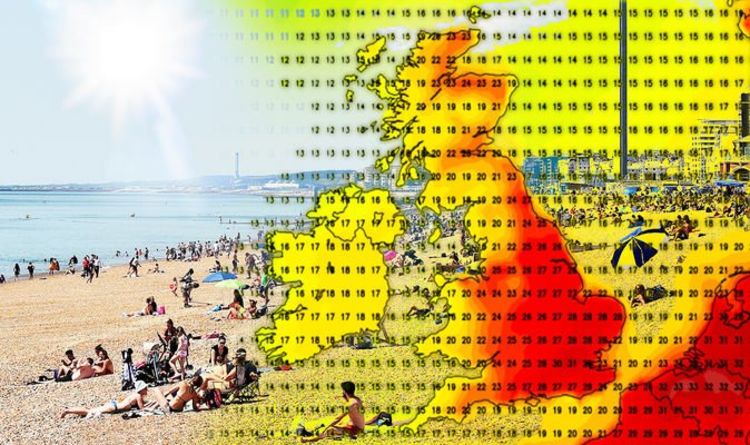
Temperatures exceeding 40°C in the UK sounds unfathomable today, but this could become the new norm by the end of the century under current greenhouse gas emissions trends. Researchers at the Met Office in the UK devised a mathematical model that suggests temperatures in excess of 40°C may be reached every 3.5 to 15 years by 2100.
In 2019, the UK registered its highest ever temperature, when weather stations in Cambridge recorded 38.7°C. Typically, Britons would only see this kind of dramatic heat during their summer trips to Spain or Italy. Now, heatwaves are hitting closer to home than many would have liked — and the consequences can be devastating.
During that summer heatwave, 900 extra deaths were recorded in England alone, according to statistics released by Public Health England. In the last four years, 3,400 people have died early during periods of extreme temperature in England.
Many more preventable deaths are expected by the end of the century, as a result of rising temperatures fueled by greenhouse gas emissions.
Nikolaos Christidis, senior scientist at the Met Office Hadley Centre in Exeter, and colleagues estimated changes in surface temperatures in the UK for medium- and high-emission scenarios.
“While attribution studies have provided plenty of evidence that heatwaves in Europe and the UK have been increasing in both frequency and intensity under the effect of human influence, one major challenge in attribution research is examining changes on small local scales. Such analyses would require regional models, which would need to be evaluated against local observations that are not always available,” Christidis told ZME Science.
Unlike other studies that estimated changes in temperature based on emissions trends, the new research employed high-resolution datasets that allowed the researchers to “relate local to UK-mean changes in extremes.”
“We then apply these observationally-based relationships to downscale data from global climate models and assess changes in the chances of extremes everywhere in the UK. It was very interesting producing maps of the changing risk of extremes in the UK, which can display in remarkable detail local features like the effects of orography,” Christidis added. Orography is the study of the topographic relief of mountains, and can more broadly include hills, and any part of a region’s elevated terrain.
Man-made climate change increased the probability of 40°C in the UK by about 10 times
The climate model showed that higher emissions increased the odds of temperatures above 35°C becoming increasingly common. The effect was most pronounced in the southeast of the country, where temperatures above 35°C could occur every year by 2100, rather than every five years today.
Meanwhile, the north of the country, which is known for its chilly weather, can expect 30°C up to once a decade by 2100.
An outside temperature of 40°C or more is a freak occurrence in the UK, estimated to only occur every 100 to 300 years. However, these scorching hot levels could be seen every 15 years under a medium-emissions scenario and as frequently as every 3.5 years under a high-emissions scenario.
“There is always a probability that we may hit 40° C in the UK, but this probability would have been exceptionally low without human-caused climate change. Climate change is estimated to have increased the probability up to about 10 times, though the event is still rare in the current climate with a return time of a few hundred years. Going forward, the probability is rapidly increasing and by the end of the century, 40 degrees may be observed every 3-15 years depending on the pathway of future greenhouse gas emissions. Looking at the observational record we see that some areas in the southeast have seen warming trends as high as 1 degree per decade. Temperatures at the end of the century will depend on whether warming will continue at the same rate, or whether we will see higher/lower trends,” Christidis told ZME Science.
These bleak projections suggest that the UK might become unbearably hot during some summer days by the end of the century, with important consequences for public health and the economy.
“We know from past extreme events that heatwaves are associated with a range of adverse impacts like spikes in mortality, detrimental impacts on transport infrastructure, agriculture, water availability, etc. The severity of future impacts would of course depend on how well society will have adapted to more frequent and intense heat extremes,” Christidis warned.
Almost every year ahead of us will become a ‘record-breaking’ one in terms of temperature. Such studies underscore the urgency of cutting back on fossil fuels in favor of emissions-free alternatives, such as wind or solar. But for such a transition to occur within a sensible timeframe, all stakeholders have to be involved — from policymakers and industry to regular people.
“We also aim to keep a global perspective looking at changes happening around the world. Having reliable scientific information on how climate change has influenced extremes so far and how it may do so in the future is important not only to decision-makers, but also to the public that needs to build its resilience to weather and climate extremes.”
The findings were reported in the journal Nature Communications.






